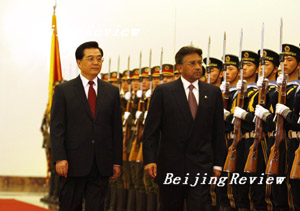
"Deeper than the ocean and higher than the mountain." This is how visiting Pakistani President Pervez Musharraf has described Sino-Pakistani relations.
Musharraf made the comment during his five-day official visit to China, starting February 19, when he met Chinese President Hu Jintao, Premier Wen Jiabao, as well as representatives from Chinese industrial and business circles. Musharraf also delivered a speech at the Chinese Academy of Social Sciences, China's think tank, in Beijing.
During his stay in Beijing, China and Pakistan signed a total of 13 cooperation agreements in defense, trade, energy, food, agriculture, education, health and meteorological science and technology.
In an exclusive interview with Beijing Review before he concluded his stay in the capital, Musharraf further expressed his determination to continue fighting international terrorism, resolving disputes with India on Kashmir, and preventing nuclear proliferation. He also elaborated on Pakistan's foreign policy.
Beijing Review: Mr. President, you are concluding your visit to China. Are you satisfied with your trip? What do you think is the most important result of your visit?
President Pervez Musharraf: We are very happy and fully satisfied. It is difficult for me to single out one result as the most important. Our relationship is actually very broadly based. We have a strong political relationship, and close commercial and trade relationships. We also have a close defense relationship and a strategic relationship. We have cooperation on nuclear power. We also discussed issues in other sectors, such as health and education, as well as every other aspect of our relationship. And we achieved many concrete results.
Enhancing economic and trade cooperation with China certainly is a major purpose of your visit. You have emphasized many times that Pakistan can serve as a "trade corridor," "energy corridor" and a "transport hub" in the region. What are the unique conditions for Pakistan to play such roles as compared with other countries in the region?
It [The corridor] is important for Pakistan, and it is also important for other countries. One has to consider mutual benefits whenever you develop a relationship with any other country. They attract you and you attract them.
Pakistan's geography gives us a lot of advantages to serve as the "corridor," because it is the center between South Asia, China and Central Asian republics. For anyone who wants to interact between these regions, it is not possible without Pakistan.
We are very proud of the fact that China has opened up to the outside world. It is investing in the world. But the country gets oil from Saudi Arabia and transports the oil all the way around to its east coast. The transport route is very long. China also trades with Europe, Africa, the Middle East and India. How can China do all this through its east coast? China can go through Pakistan. Pakistan is conscious it can provide a link. Because of our friendship with China and Central Asian republics, we would like to provide a shortcut route and contribute to all kinds of trade and energy cooperation. Therefore, I call Pakistan the trade and energy corridor of the region.
What are your country's foreign policies and its current priorities?
"We want to have a peaceful and harmonious relationship with all countries in the world." --Pakistani President Pervez Musharraf
Our policy is very clear. We want to have peaceful and harmonious relationships with all countries in the world, so as to develop our economy as fast as possible. This is the objective of our foreign policy.
| 